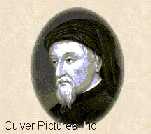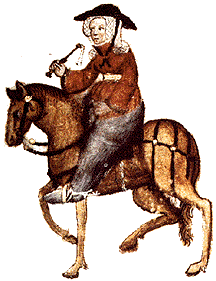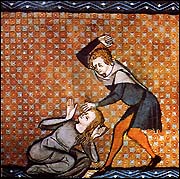
The Canterbury Tales is Geoffrey Chaucer's greatest and most memorable work. In The Canterbury Tales, Chaucer uses "a fictitious pilgrimage [to Canterbury] as a framing device for a number of stories" (Norton 79). In "The General Prologue" of The Canterbury Tales, Chaucer describes in detail the pilgrims he meets in the inn on their way to Canterbury. Chaucer is the author, but also a character and the narrator, and acts like a reporter to provide a detailed description of the pilgrims. Through his description, the reader is able to paint a picture of each of the characters. In "The General Prologue," he describes each character by giving a detailed description of the character's appearance, clothing, social status, beliefs, and other relevant details. However, Chaucer never condemns his characters: "What uniquely distinguishes Chaucer's prologue from conventional estates of satire, however, is the suppression in all but a few instances of overt moral judgement. . . . It is up to the reader to draw up the moral indictment from the evidence presented with such artlessness even while falling in with the easygoing mood of 'felaweship' that pervades Chaucer's prologue to the pilgrimage" (Norton 80-81). Chaucer is thus able to create a tension between the ideal and the real. He builds up the reader's expectations and then shatters them. Although The Canterbury Tales was probably written in the late fourteenth century, many of the pilgrims of The Canterbury Tales seem real and true to life even today. One of the most memorable pilgrims of The Canterbury Tales, as well as one of the most memorable women in literature, is the Wife of Bath. The "lusty and domineering" Wife of Bath seems more like a woman of the twentieth century than a woman of the fourteenth century (Norton 80).

In "The General Prologue," Chaucer describes the Wife of Bath as a deaf, gap-toothed woman. She has a bold face and wears ten pounds of "coverchiefs" and a hat on her head (Chaucer 91). She wears a skirt with red stockings and tight-laced supple shoes. She is also a great weaver and has been on many pilgrimages. She is described in "The General Prologue" as being a worthy woman who has only had five husbands. She knows all the remedies of love and is an expert at and preaches and practices the art of love.
In her "Prologue," the Wife of Bath starts out by saying she is a believer in experience rather than authority. She says, "Experience, though noon auctoritee Were in this world, is right ynough for me" (Chaucer 117). The Wife of Bath has been married since the age of twelve and has had five husbands. So she definitely has a lot of experience in the area of sex and marriage. Therefore, she says that she is a strong believer in experience as opposed to written authority such as the Bible. She does not see anything wrong with the fact that she has had five husbands, because she says that even God wants man to increase and multiply: "God bad is for to wexe and multiplye: that gentil text can I wel understonde" (Chaucer 117). In fact, she is going on this pilgrimage to Canterbury with the hope of finding her sixth husband. Even though the Wife of Bath says she is a believer in experience rather than authority, she often quotes and uses the Bible to support her ideas and beliefs, though she misquotes more often than not.
The Wife of Bath then makes an interesting argument against virginity. She says:
The Wife of Bath argues that if God had condemned marriage and wanted people to be chaste, then where would people come from? If everyone was supposed to be chaste, then there would be no people, and hence, no seed for virginity to grow from. The Wife of Bath believes that everyone has a gift from God, and she thinks her sexuality is her gift. People are called to different works by God, and hers is her sexuality. She believes that God has given man sexual organs for both reproduction and pleasure. In her opinion, God has given her this great sexual instrument, and she will use it as often as she can. She does not envy virginity, but believes that virginity is perfection and is not meant for everyone. She says, "I nil envye no virginitee: Lat hem be breed of pured whete seed, And lat us wives hote barly breed--" (Chaucer 120). The Wife of Bath is extremely proud of her sexuality and has no regrets; she is perfectly happy being barley bread.
In an age when men had superiority over women and women were totally dependent on men, the Wife of Bath claims that men owe women the debt of sex in marriage. She says:
The Wife of Bath believes that the husband is his wife's slave and owes her for life. She believes that as his wife she has control and power over him and owns his body and flesh. This is a serious inversion of Church teachings, in which women were subordinate to men, but oddly enough, the idea of the husband owing the wife the marriage debt of sex and financial support is found, from an early date, in Jewish religious texts and law for example. It is, thus, the husband's duty to pay his wife his sexual debt for life according to the Wife of Bath. The Wife of Bath is extremely blunt and open about her ideas and her sexuality. The Pardoner is offended by what she says and interrupts her to tell her that he was considering marriage, but after what he has heard, he is grateful that he is still single.
The Wife of Bath takes great pride in the fact that she has had sovereignty over all her five husbands. She is very well situated, because her first three husbands were old and wealthy. In her "Prologue," she tells the other pilgrims about the techniques she used to gain control over her first three husbands. She says, "I governed hem so wel after my lawe" (Chaucer 122). She hates the fact that her fourth husband had a mistress. So to punish him, she makes him jealous by letting him think that she is not faithful to him, even though she really is. She says, "in his owene grece I made him frye" (Chaucer 127). She gains sovereignty over her fourth husband only by surviving him.
The Wife of Bath has lived her life to the fullest and she does not regret anything. In her youth she has had many lovers and has had a good time. Even though age has taken away her youth and figure, it makes her feel good to think that she has really enjoyed herself in her youth. She says:

The Wife of Bath marries her fifth husband for love and not for money. Even though her fifth husband beats her, she says that she loved him the most. One night he beats her for tearing pages from a book. He hits her so hard that she becomes deaf in one ear. Realizing what he has done, he asks for her forgiveness. She says:
In this way the Wife of Bath is able to gain sovereignty over her fifth husband. A similar theme is expressed in "The Wife of Bath's Tale." According to "The Wife of Bath's Tale" women most desire sovereignty in marriage and over their husbands.
In conclusion, even though The Canterbury Tales was written in the late fourteenth century, many of the characters in The Canterbury Tales seem real, even today. One of the most memorable pilgrims of The Canterbury Tales is the Wife of Bath. She is a "lusty and domineering" woman who is proud of her sexuality and believes that a woman should have sovereignty in a marriage (Norton 80). She is also extremely blunt and outspoken about her ideas and beliefs. Despite being a woman of the fourteenth century, her ideas, beliefs, and behavior are more like a woman of the twentieth century or possibly even the twenty-first century. She is truly a woman ahead of her time.